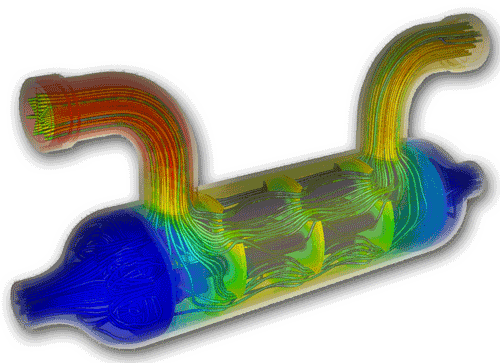
Computational Fluid Dynamics (CFD), sometimes referred to as flow simulation, is a computer simulation technique that allows the fluid flow around or through any product to be analysed in great detail. CFD allows the fluid mass flow, velocity, density, temperature, pressure, concentration or any derived fluid property to be calculated at all locations within the flow field. The interaction of the fluid with its solid boundaries, such as fluid-dynamic forces and heat transfer rates can also be calculated accurately for use in stress analysis.
By using this technique, designers can verify that their products will conform to a client’s specifications early in the design cycle, greatly accelerating the product development process. CFD can be used to
calculate design mass-flow rates, pressure drops,
heat transfer rates, and fluid dynamic forces such as
lift, drag and pitching moments.
The accuracy and fidelity of modern Computational Fluid Dynamics methods has significantly increased the level of design insight available to engineers throughout the design process and therefore greatly reduces companies’ exposure to technical risk when developing thermal and fluid-based products. The use of CFD in design generally leads to far fewer physical prototypes being necessary during development, far less prototype testing and consequently reduces the time-to-market and cost-to-market substantially.
Dynamiq Engineering is a member of NAFEMS, the international body for engineering analysis & simulation and conducts all types of CFD in line with industry best practise guidelines using OpenFOAM, Fluent, CFX and Solidworks Flow Simulation.
Benefits of Computational Fluid Dynamics include:
• Unmatched insight into systems that may be difficult to prototype or test through experimentation
• Ability to foresee implications of design changes and optimise accordingly
• Accurately predict mass flow rates, pressure drops, mixing rates, heat transfer rates & fluid dynamic forces
Applications include:
• Aerodynamics
• Industrial Fluid Dynamics
• Fluid Structure Interaction
• Heat Transfer
• Hydrodynamics
• Multi-phase Flows
Carrying out accurate and technically meaningful computational fluid dynamics simulations requires highly skilled and experienced specialists. Not only does Dynamiq Engineering provide CFD analysis using the worlds most advanced CFD software, but all of our technical staff are qualified to doctoral level and widely experienced. Crucially, as a technology development and engineering company, Dynamiq Engineering leverages the most advanced CFD techniques to provide real-world engineering outcomes that are practical, cost effective and commercially viable.
If your organisation requires specialist CFD Services, Design Troubleshooting, Product Qualification or independent CFD analysis of your products, Dynamiq Engineering has the expertise, resources and experience to meet your requirements.
For a no-obligation discussion of your requirements with one of our experienced experts,
 |
 |